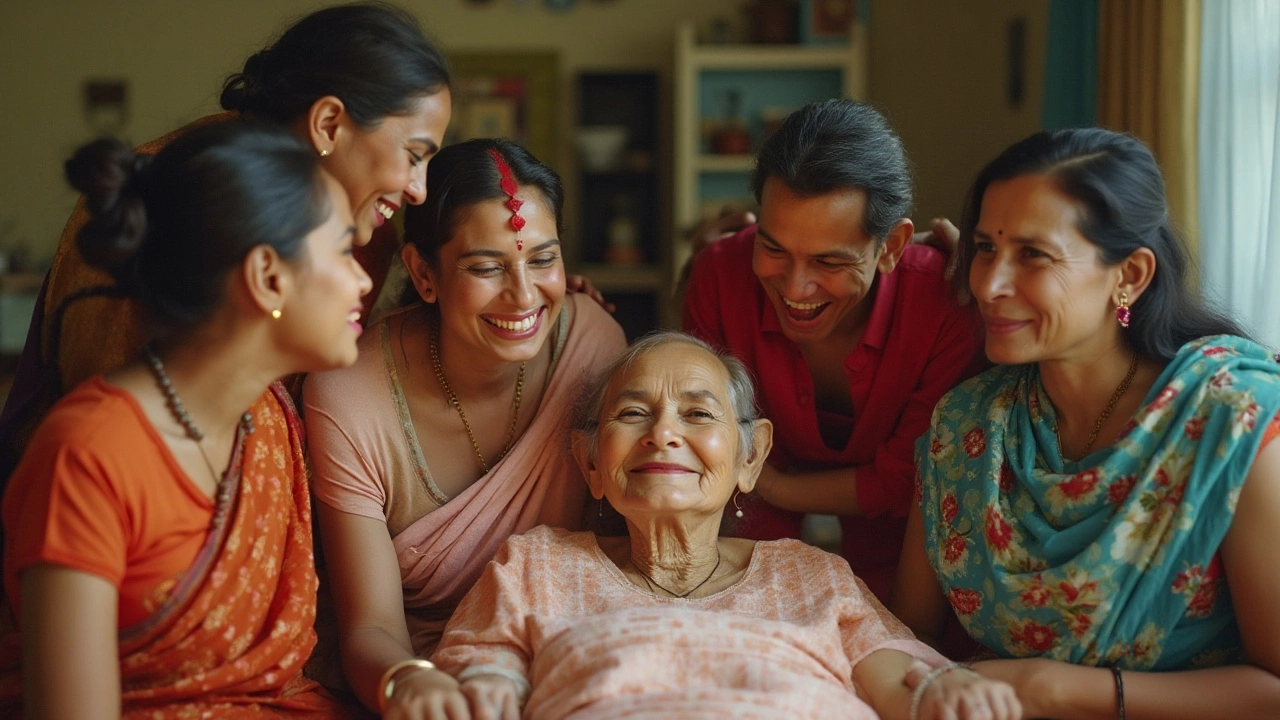Cancer remains one of the most formidable health challenges many face today. It doesn’t just affect a specific part of the body but has a profound impact on one's overall well-being. Recognizing when your body is struggling can be essential to getting the right help at the right time.
Often, when cancer is reaching a critical point, the signs might not be as obvious as one would suspect. These warning signs, many subtle, become crucial indicators that something is amiss and needs attention. From fatigue to significant weight changes, these symptoms shouldn't be ignored.
Understanding these changes can empower individuals and their loved ones to seek help promptly, ensuring any interventions are timely and effective. By knowing what to look out for and how to manage these symptoms, patients can navigate these challenging times with more ease.
- Understanding Cancer and Its Effects
- Common Early Warning Signs
- Managing Physical and Emotional Changes
- Seeking Medical Intervention and Support
Understanding Cancer and Its Effects
Cancer is a term used to describe a multitude of diseases characterized by the uncontrolled division and growth of abnormal cells. This unregulated cell proliferation can occur in almost any part of the body and often spreads to other areas as the disease progresses. The reasons behind this rampant cellular behavior often include genetic mutations, environmental exposures, and lifestyle factors. Each type of cancer comes with its own set of challenges and effects on the body, which necessitates a nuanced understanding of the disease's complexities. Recognizing the cancer symptoms early can make a profound difference in treatment outcomes and quality of life.
The journey of understanding how cancer affects the body begins with acknowledging the fundamental disruption it causes. Normal cells in our body follow a carefully regulated cycle of growth, division, and death, which ensures that our organs function properly. However, cancer cells bypass these controls, persisting in a rogue state where they don't die when they should and instead form lumps or tumors. These masses can be benign, which are relatively harmless, or they can be malignant, posing significant health risks as they invade and destroy healthy tissue. This invasive nature is responsible for some of the critical problems associated with the body's shutting down as cancer progresses.
"The fear of cancer can be more traumatic than any other disease's diagnosis, often leading patients to consider how the body will react to treatment and eventual progression," mentions Dr. Lisa Miller of the Cancer Research Institute. Indeed, coping with cancer warning signs requires mental and emotional resilience in addition to physical strength.
One of the most significant effects of cancer on the body is its impact on energy levels and metabolic processes. As cancer cells consume resources at an alarming rate, they can lead to significant weight loss and fatigue, which are some of the common indicators of body shutting down due to cancer. These effects can severely restrict a person's ability to perform everyday activities. The body's immune response might also become compromised, leading to increased susceptibility to infections and a longer recovery period from illnesses.
Additionally, as cancer progresses, it often metastasizes, meaning it spreads from its origin to other organs, complicating symptoms and treatment. This spread marks a profound change in how a person's health must be monitored and managed. For instance, a term often used in clinical settings is 'cachexia,' a condition characterized by uncontrolled weight loss and muscle wasting, a direct consequence of cancer's toll on the body. Understanding these processes and their potential signs is crucial for anyone navigating the challenging journey of cancer treatment.

Common Early Warning Signs
Cancer often manifests in ways that are subtle enough to be dismissed as routine ailments or stress responses. However, the key to catching the disease early lies in understanding these nuances. One of the common early warning signs entails persistent, unexplained fatigue that cannot be relieved by rest. This kind of fatigue is different from general tiredness and often indicates that the body is diverting substantial energy to fight an underlying disease process like cancer. Patients may find themselves needing more rest yet feeling consistently worn out, impacting daily activities and productivity.
Weight fluctuations without a clear reason—such as changes in diet or exercise—are also significant indicators. Unintentional weight loss, particularly shedding more than 10 pounds in a short span, can signal various cancers, especially those affecting the digestive system. This symptom occurs because the body's metabolism is altered by cancer cells stealing nutrients, leading to emaciation. Unexplained weight gain or bloating, on the other hand, might indicate cancers like ovarian cancer, where fluid accumulates in the abdominal cavity.
Another tell-tale sign is chronic pain that persists or progresses over time. While pain is typically associated with more advanced stages, it can be an initial symptom for certain cancers. For instance, constant back pain might suggest cancers of the pancreas, or bone pain could be an early indicator of leukemia. It’s crucial for individuals to listen to their bodies and notice persistent aches that don’t subside with typical treatments.
"Cancer doesn’t give up, it changes shape and keeps on moving forward,” says Dr. Paul Farmer, emphasizing the relentless nature of the disease and the importance of timely diagnosis and intervention.
Additionally, changes in skin appearance, such as new lumps or changes in the size, shape, or color of a mole, can be early signs of skin cancers like melanoma. These changes are often accompanied by symptoms like itching, tenderness, or bleeding on the surface of the growth. Interestingly, certain systemic cancers also manifest symptoms through the skin, such as jaundice, which can be an early warning sign of pancreatic cancer.
Persistent coughs or hoarseness, especially in individuals who smoke or have a history of smoking, should not be overlooked. These symptoms might seem benign but can occasionally herald lung or throat cancer. Similarly, changes in bowel or bladder habits, such as continuous diarrhea, constipation, or blood in the stool or urine, can point towards colorectal or bladder cancer, necessitating immediate medical consultation.
To encapsulate the gravity and range of cancer warning signs, here’s a quick glimpse:
- Fatigue and sleep disruption that rest cannot ease
- Sudden and unexplained weight changes
- Persistent and unexplained pain or new lumps
- Skin changes—new moles or color and texture alterations
- Prolonged cough or hoarseness
- Altered bowel or urinary patterns
Recognizing these signs early and seeking medical attention can drastically affect outcomes. It’s about being in tune with your body, and when in doubt, consulting healthcare professionals for further investigation.

Managing Physical and Emotional Changes
Experiencing a serious illness such as cancer is not just a fight of the body but a battle of the mind and emotions as well. When the body starts signaling a shutdown, it's often accompanied by a slew of physical and emotional changes that need careful attention and management. Patients often face significant discomfort due to symptoms such as increased fatigue, loss of appetite, and declining energy levels. These physical changes can sap someone's strength and spirit, making it challenging even to carry out daily tasks. This fatigue is a common warning sign that cannot be ignored, as it reflects the body's struggle to keep up with the demands placed on it due to the illness.
From an emotional standpoint, receiving a diagnosis that indicates a tough battle ahead can bring about intense feelings of fear, sadness, and even anger. The uncertainty of outcomes and treatments can lead to a rollercoaster of emotions that might seem overwhelming at times. However, it is crucial to address both physical and emotional health concurrently. Patients are encouraged to communicate consistently with their healthcare teams about any new symptoms or changes they observe. This ensures that modifications in treatment plans can happen timely, potentially improving quality of life during challenging moments. Support groups and counseling can be invaluable in helping manage emotional struggles, providing comfort in knowing one is not facing these challenges alone.
Dr. Sarah Hughes, an oncology specialist, once mentioned, "The journey through cancer treatment is as much about mental resilience as it is about physical endurance. Addressing emotional health is critical in helping patients cope with their journey."
Looking after one's mental health is an essential facet of coping with cancer. Engaging in mindful practices such as meditation or gentle yoga can help foster a sense of peace amidst the turmoil. Emotional self-care must accompany physical care to promote a holistic approach to health. Family and friends play a vital role by providing supportive environments. A support system can bolster a patient's spirit and significantly contribute to improved emotional outcomes. Furthermore, proper nutrition and, if possible, regular physical activity tailored to one's ability, can provide a semblance of normalcy and control.
Practical strategies can be employed to ease the management of both physical and emotional changes. Breaking down tasks into smaller, more manageable steps can help conserve energy and reduce stress. Embrace flexibility in daily routines, allowing space for rest when necessary. Prioritizing activities and focusing on energy expenditure only for the most important tasks can help maintain stamina. Understanding that every patient's journey is unique is key. What works for one individual may not necessarily work for another; hence personalization in coping strategies is indispensable. This approach ensures that the most suitable methods are adopted to help navigate the complexities introduced by cancer, ultimately leading to better outcomes in both physical and mental health.

Seeking Medical Intervention and Support
When dealing with the complex world of cancer, timely medical intervention often acts as the decisive factor between managing the condition and allowing it to progress unchecked. It is crucial for both patients and caregivers to understand the importance of seeking professional help at the earliest signs of the body shutting down. Collaboration with a healthcare team can provide not only medical but also emotional support, fundamental in navigating this challenging journey.
Initially, contacting a primary care doctor or an oncologist should be your first step when unusual symptoms appear. These experts can perform diagnostic tests, which often include blood tests, imaging scans like a CT or MRI, and biopsies, to determine the stage and extent of the cancer. Early diagnosis can often present options for treatments which may significantly reduce symptoms and prolong life. It’s essential to understand the importance of appointments and treatment schedules, as these are tailored to each patient's unique condition.
An interdisciplinary approach is increasingly common in cancer care today. It's not just about addressing the physical symptoms but also about managing the emotional and psychological toll that comes with a cancer diagnosis. In many hospitals, teams of doctors, including oncologists, palliative care specialists, dietitians, and mental health professionals, work together to craft a comprehensive care plan. Such an integrated strategy can significantly enhance the quality of life for patients.
"The earlier we can intervene, the more options we have to help manage the symptoms and support our patients," says Dr. Lisa Hamilton, a leading oncologist at the Sydney Cancer Centre.
Support doesn’t end at medical intervention. Emotional support is equally crucial. Counseling services, particularly for those grappling with the psychological aspects, can be beneficial. Support groups, often spearheaded by hospitals and nonprofit organizations, offer a platform for sharing experiences and strategies among patients and caregivers. They form a community that understands the unique challenges one faces and provides solace knowing others are walking a similar path.
Advancements in treatment technologies and pharmacology have made it possible to effectively manage many symptoms associated with cancer. Chemotherapy, immunotherapy, targeted drug therapy, and radiation are just a few of the options available. Each treatment has its own set of protocols, potential side effects, and expected outcomes. Understanding these can empower patients to make informed decisions about their care. Open discussions with healthcare teams about the objectives and side effects of each treatment option help tailor these interventions to each patient's needs.
Finally, it is pertinent to consider practical steps that can be taken, such as keeping a symptom diary. Track any changes in symptoms, note their frequency and severity, and report them during check-ups. This proactive approach ensures that healthcare providers have an accurate snapshot of how the patient is managing and can make adjustments to care plans promptly. Education on these techniques can empower patients to take charge of their health journey, providing a sense of control in a situation that often feels uncontrollable.
